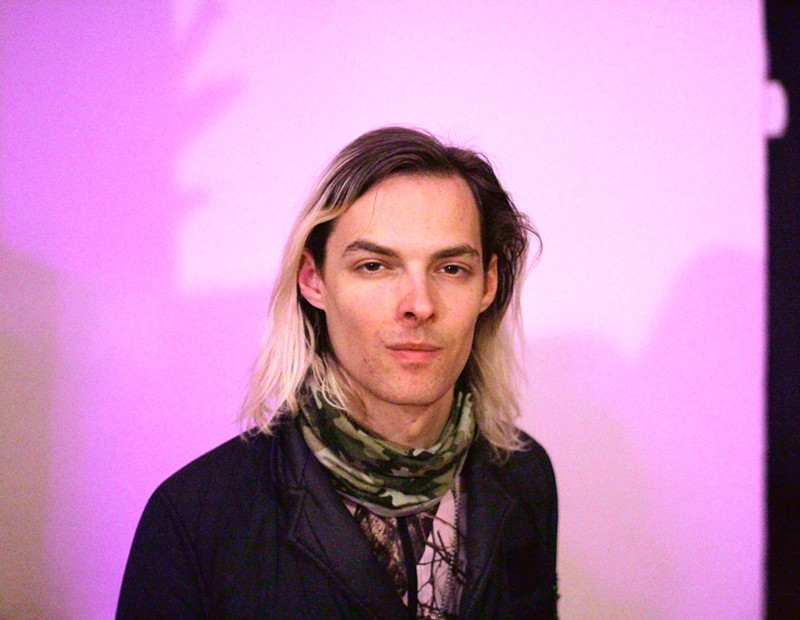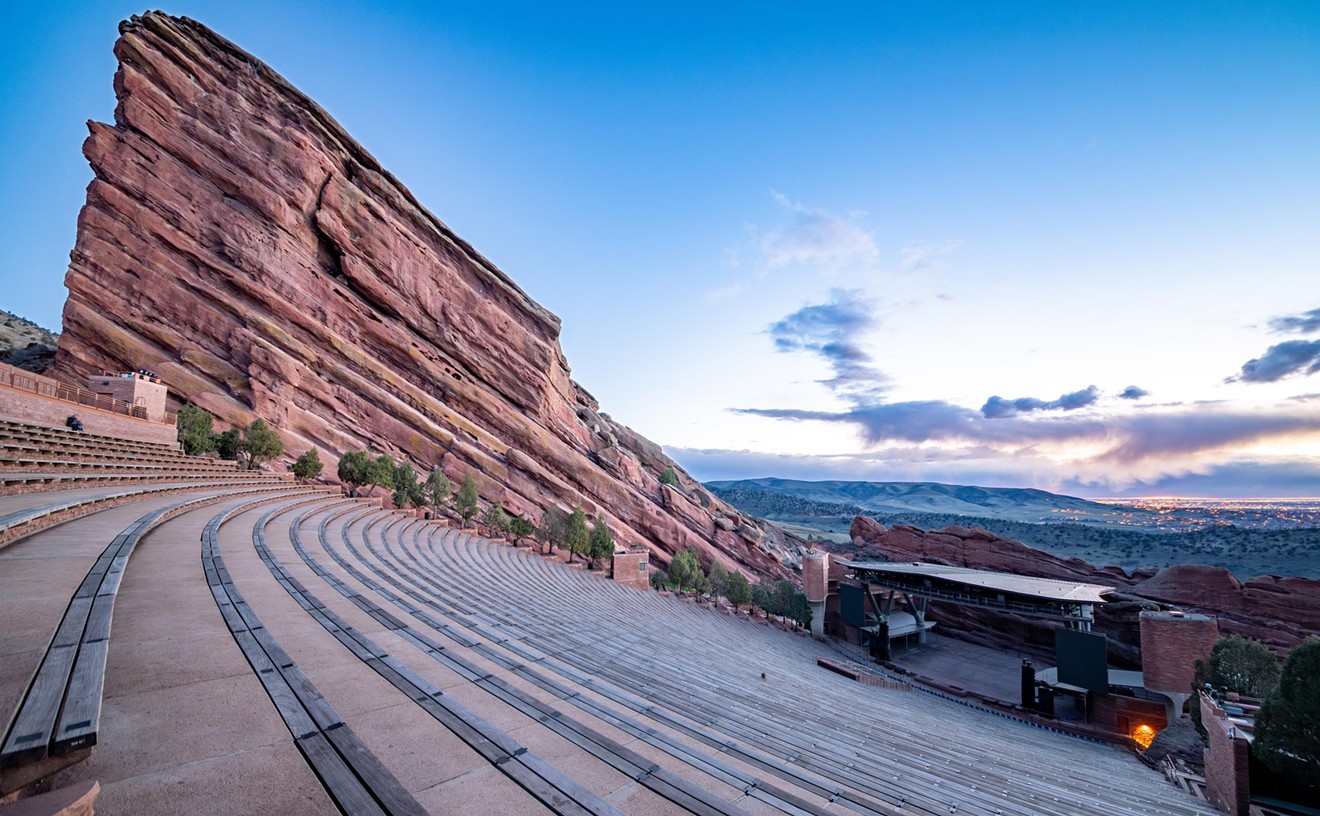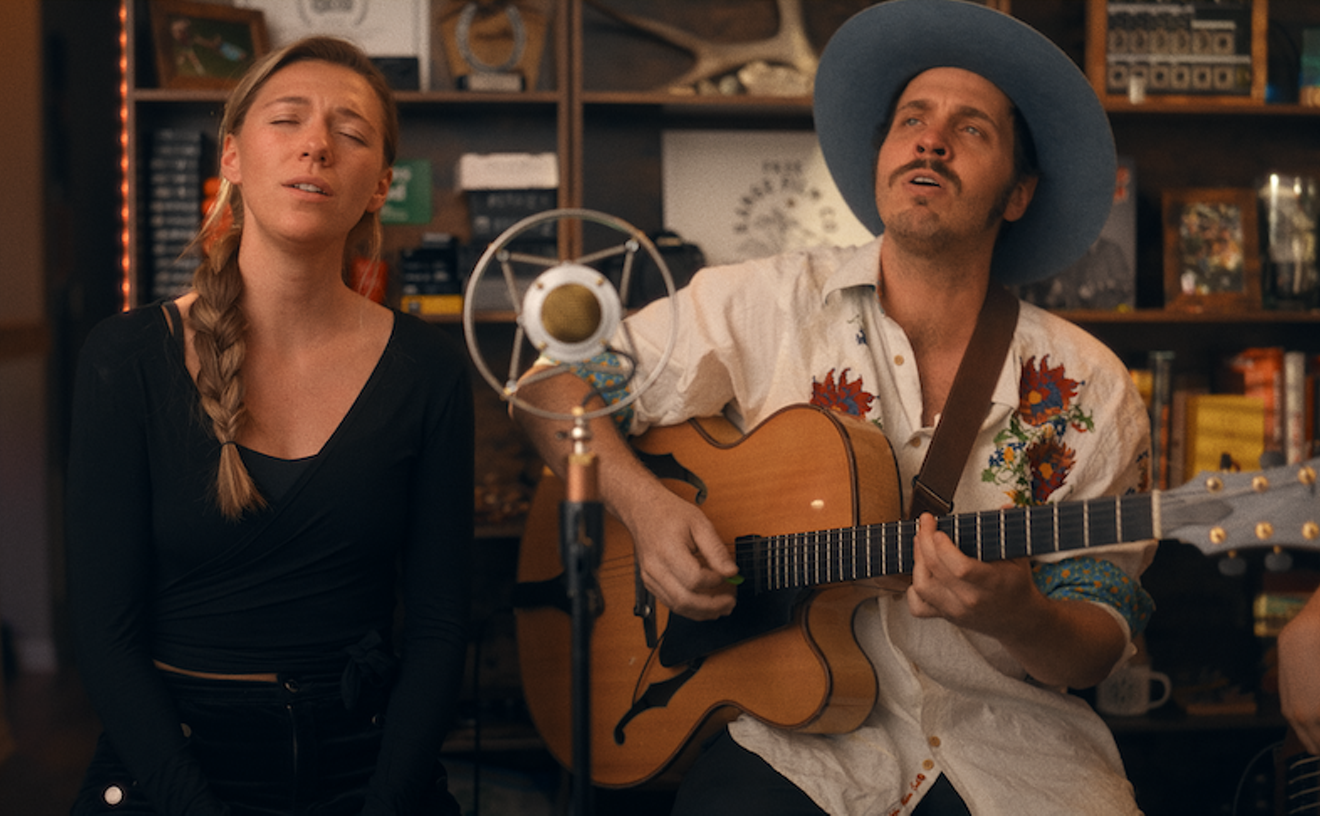Luke Thinnes is an artist’s artist. Starting out playing experimental noise sets at open mics in bourgeois Boulder coffee shops in order to troll Fair Trade coffee sippers who just wanted to enjoy the soothing sounds of amateur folk music, Thinnes is rarely creatively confined by the expectations of others.
He has more than a hundred self-published releases, and he's enjoyed the freedom from restrictions that a label might put on him. However, in recent years, he's opened himself up to the possibility of releasing music on other people’s terms.
Late last year, under the name French Kettle Station, he put out the EP Spirit Mode on Belgian experimental music label Slagwerk. More recently, as Dubharp, he signed to the enigmatic Los Angeles DIY label 100% Silk and dropped the EP Spiral Heights.
Dubharp is an apt name for the realm that the music inhabits, where resonant, drifting, metallic timbres meet the stripped-down, rhythm-focused aesthetic of dub.
It’s this concoction that drew the attention of venerated dub pioneer Lee “Scratch” Perry and Brian Eno-endorsed ambient-music stalwart Laraaji, both of whom collaborated on the release.
Westword caught up with Thinnes to talk about his artistic approach, his identity (or lack thereof), his collaborations, and the local artists that drew his ear while he managed the Denver DIY venue Rhinoceropolis.
Westword: This is the second album that you’ve put out through a label. However, you've had tons of other releases. What made you decide to go the label route? Would you ever go back to self-releasing, and why?
Luke Thinnes: Unlike self-releasing, labels have a certain standard of quality and consistency to their output. It felt good to experiment within the parameters of another entity, but I will always self-release in addition to any label-oriented opportunities that come my way. I enjoy the immediacy and lack of expectation that comes with the independent release, as well as the aim of assembling a massive body of work.
How do you think a label's consistency and standards are impacting artistic innovation?
My experience on this release was unique in the sense that I did not have a full album completed which I then forwarded to the label, but instead I was sending individual tracks as they were completed for feedback. Having a track-by-track response helped me focus and actualize which qualities resonated in an auxiliary fashion, which is something I could never conceptualize on my own. As far as the impact labels have on innovation, it's a 50/50 responsibility shared with the artists, of course, but great curation and having a vision as far as bringing artists together is always an endeavor which has tremendous potential to become more than the sum of its constituent parts.
You got to work with two of your idols, Laraaji and Lee "Scratch" Perry. How did that come about?
I emailed both of them last summer without expecting a response, and was extremely surprised to hear back from Lee almost immediately. The vocal track was recorded at House Ah Knowledge Studio in Westmoreland, Jamaica, and though our interaction was limited to email, it is nonetheless a supremely high honor of my life to have collaborated with him.
I had been in touch with Laraaji since booking him at Rhinoceropolis in July 2019, yet didn't expect to hear back from him, as he was in the process of finishing up the three records he released last year. After about a month with no contact, he sent a WeTransfer folder with the zither stems. It was honestly intense syncing up and playing through his tracks for the first time while reflecting on how much his music has inspired and healed me over the last decade. Their appearances absolutely make the album what it is in more ways than one.
Do you ever feel satisfied with the music that you make?
It has been said many times before: "The perfect is the enemy of the good." The quality of perfection seems either conjured by spontaneity or sub-optimal circumstances, and even that is a matter of my own opinion. At any rate, striving for perfection strikes me as an unproductive outlook for anybody trying to avoid being victimized by their own work.
Is there such a thing as the perfect album, where, once it was finished, there really is no going up, so you might as well stop?
The creations of mine that I have enjoyed the most seem to resonate with others the least, and vice versa. I have discussed this effect with other artists and have concluded this: At some point in an artist's career, they become overly focused on the very things which destroy the essence of their work, such as reputation, recognition, or simply over-polishing their work. I can't think of a historical example involving a mutual conception of "masterpiece" between the creator and the masses, but that may possibly be a strong motivator which keeps artists trying and trying for generations and generations.
Do you think the masses would even know at the time that it was a masterpiece? Talk Talk's Spirit of Eden and Laughing Stock come to mind, as well as the Beach Boys' Pet Sounds, all three of which were either overlooked or heavily criticized, yet are now considered revolutionary. Can you think of any albums that, once they came out, people immediately recognized their genius?
With the nature of hype being what it is in this day and age, I imagine any concept of "masterpiece" to be so heavily obscured by people's adherence to the tropes of their era that only time and distance from the work could possibly allow for that quality to become apparent. The distribution of music via the internet has obviously made the act of cashing out on a certain trend's popularity way more accessible, and this has had a negative effect on how people reflect on the artistic movements contained within their epochs. My idea of a masterpiece has always been one which synthesizes the utilities of its era to create something deeply reflective that could only exist in its time, and to recognize something like that in the instant of its conception seems like an abnormally prescient act.
You were voluntarily managing Rhinoceropolis for a while, yet recently moved on from it. How do you think your identity as a musician was shaped by it, and do you think it’s any different now that you’ve relinquished your role?
I will say I spent my time at Rhinoceropolis attempting to promote the eclectic and unclassifiable, but that vision was perhaps not accommodating enough for its time and circumstance. I wouldn't say I relinquished my role as much as I grew out of the pitfalls that were inherent in running a space like Rhinoceropolis. The biggest difference, having freed myself of any involvement with the space, is that I feel like I can be appreciated for what I do as an individual rather than the difficulties and criticisms that come with voluntarily managing a legacy like Rhinoceropolis, and that has had a tremendously positive impact on my well-being.
Additionally, I strongly believe that identity, in all cases, is a condition one should work to free themselves of. I am hard-pressed to think of something less inspiring than making declarations such as "I am a blank type of person" or "I only enjoy blank." Who wants to live beneath such a low ceiling? There is so much more to life than putting yourself inside of a box.
Since you were involved with Rhinoceropolis for such a long time, there are probably some local artists who stand out to you. Obviously, it’s hard to pick and choose; however, are there any that particularly stand out to you, and why?
A hero of mine recorded six albums ten blocks from where I live in Denver over thirty years ago; his name is Geoffrey Landers. I connected him with the Amsterdam-based label Music From Memory in 2017 for a double-LP retrospective compilation, and I highly recommend it to anybody and everybody.
Neal Samples of Tollund Men is also a hero of mine; his output is consistent and brilliant.
My friend Kim Shively released an album as Mourning Cloaks not too long ago that is extremely beautiful. It is a cathartic collection of field recordings and soundscapes conceived in honor and memory of our late friend Colin Ward, whose rhythmic outlook deeply inspired Spiral Heights and who will hopefully one day be widely acknowledged as one of the most important artists of not just Denver history, but of this current era.
My roommate Coleman Mummery is someone I would consider to be extremely important and under-appreciated in the musical and artistic landscape of Denver. There is also a group called Goo Age, who I believe to be on the cutting edge in the electronic-music domain. Although they are extremely reclusive, I can see their HD sound and playful attitude becoming a massive influence in the digital sphere just a couple of years down the road.
Spirit Heights is out on 100% Silk and available on Bandcamp.
[
{
"name": "Air - MediumRectangle - Inline Content - Mobile Display Size",
"component": "12017618",
"insertPoint": "2",
"requiredCountToDisplay": "2",
"watchElement": ".fdn-content-body",
"astAdList": [
{
"adType": "rectangle",
"displayTargets": "mobile"
}
]
},{
"name": "Editor Picks",
"component": "17242653",
"insertPoint": "4",
"requiredCountToDisplay": "1",
"watchElement": ".fdn-content-body",
"astAdList": [
{
"adType": "rectangle",
"displayTargets": "desktop|tablet"
},{
"adType": "rectangle",
"displayTargets": "desktop|tablet|mobile"
}
]
},{
"name": "Inline Links",
"component": "18838239",
"insertPoint": "8th",
"startingPoint": 8,
"requiredCountToDisplay": "7",
"maxInsertions": 25
},{
"name": "Air - MediumRectangle - Combo - Inline Content",
"component": "17261320",
"insertPoint": "8th",
"startingPoint": 8,
"requiredCountToDisplay": "7",
"maxInsertions": 25,
"watchElement": ".fdn-content-body",
"astAdList": [
{
"adType": "rectangle",
"displayTargets": "desktop|tablet"
},{
"adType": "rectangle",
"displayTargets": "desktop|tablet|mobile"
}
]
},{
"name": "Inline Links",
"component": "18838239",
"insertPoint": "8th",
"startingPoint": 12,
"requiredCountToDisplay": "11",
"maxInsertions": 25
},{
"name": "Air - Leaderboard Tower - Combo - Inline Content",
"component": "17261321",
"insertPoint": "8th",
"startingPoint": 12,
"requiredCountToDisplay": "11",
"maxInsertions": 25,
"watchElement": ".fdn-content-body",
"astAdList": [
{
"adType": "leaderboardInlineContent",
"displayTargets": "desktop|tablet"
},{
"adType": "tower",
"displayTargets": "mobile"
}
]
}
]











